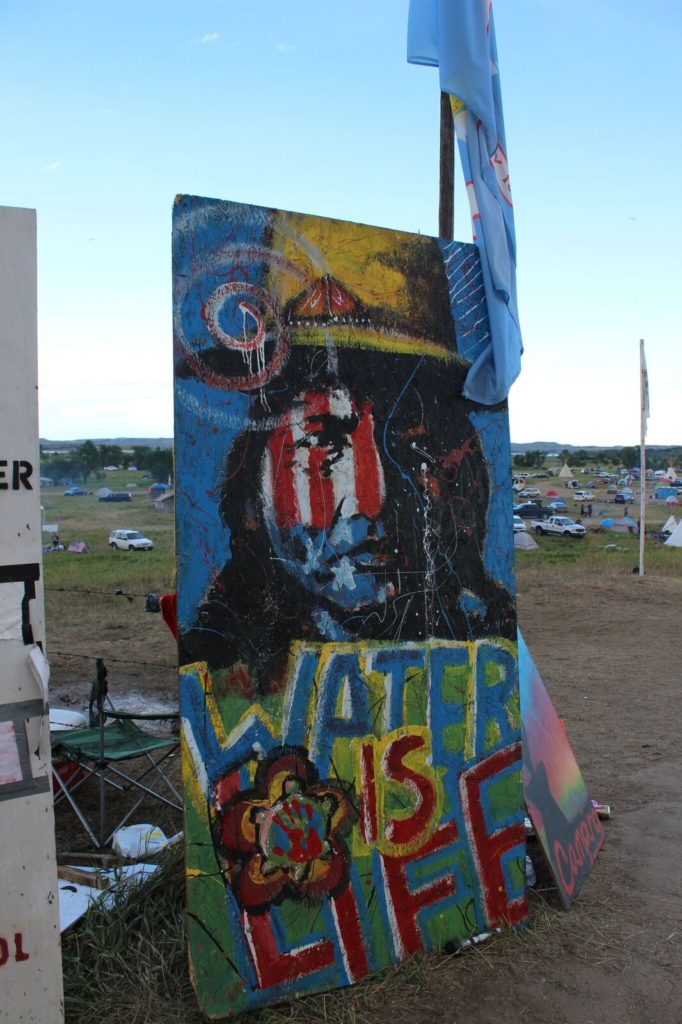Stand with Standing Rock calling 300 clergy from across U.S. to North Dakota
 Four conference ministers of the United Church of Christ, and a score of pastors from at least nine states will be part of a group of 300 clergy of several faith traditions gathering this week to stand with the water protectors at the Standing Rock Sioux Nation in North Dakota.
Four conference ministers of the United Church of Christ, and a score of pastors from at least nine states will be part of a group of 300 clergy of several faith traditions gathering this week to stand with the water protectors at the Standing Rock Sioux Nation in North Dakota.
The tribe water protectors and their allies are blocking construction of the Dakota Access Pipeline (DAPL), a $3.8 billion dollar project designed to carry oil across four states, through the sacred lands of the reservation and under the Missouri River, the water supply of millions of Americans.
“Our duty as people of faith and clergy could not be clearer: to stand on the side of the oppressed and to pray for God’s mercy in these challenging times,” writes Fr. John Floberg, an Episcopal priest who serves the reservation and organizer of the event. “There is hardly a place in North America that isn’t somehow being represented by those that are coming for this Peaceful, Prayerful, Lawful, Non-Violent witness.”
The group, which includes UCC Conference ministers the Rev. Gordon Rankin, South Dakota; the Rev. Kieth Mills, Northern Plains (North Dakota); the Rev. Shari Prestemon, Minnesota; and the Rev. John Vertigan, Florida, is responding to increased aggression by state authorities working to move the water protectors out of the way of DAPL contractors. In the last week, more than 140 people have been arrested.
“The coordinated gathering of religious leaders at the Oceti Sakowin camp will be participating in an allied action of prayer with indigenous tribes from all over the world,” said Rankin, conference minister of the South Dakota Conference United Church of Christ. “We gather to pray, not just with Christian or Jewish or Muslim prayers, but with smudge and with dancing. We are there to pray as our native sisters and brothers do.”
The gathering begins Wednesday, Nov. 2, with training, and with action at 9 a.m. Thursday, Nov. 3.
“I am going to Standing Rock for two main reasons,” said Catherine Lacey, one of several members of Spirit of Peace UCC traveling from Sioux Falls, S.D. with their pastor, the Rev. Jean Morrow. “First, solidarity. I’ve been deeply impressed with the numbers of people and number of tribes who have come together to raise their voices and act non-violently for a just cause and a planetary necessity, water protection. I want, and I want my tribe to stand with them. Solidarity in non-violent action is the only way movement toward justice and peace can happen.”
“Second, I stand against the violation of Mother Earth for profit as strongly as I object to the rape culture and violence growing in our society. One is a reflection of the other. Native spirituality has much to teach us here. I want to listen and be imaginative and innovative in developing alternate and renewable forms of energy and leave the land which sustains us in peace.”
 The Rev. Denise Griebler, pastor of First UCC in Richmond, Mich., lives in Detroit and sees a number of parallels between the struggle in Standing Rock and the one she’s lived through.
The Rev. Denise Griebler, pastor of First UCC in Richmond, Mich., lives in Detroit and sees a number of parallels between the struggle in Standing Rock and the one she’s lived through.
“I’ve been a part of the water struggle in Michigan, resisting water shut-offs in Detroit, advocating for an affordable water plan and resisting efforts to privatize our water system,” Griebler said. “We’ve called for public accountability and repair of the nearby Flint water system that is still poisoning residents. We’ve been bringing water to people who have been shut-off, protesting, blocking shut-off trucks, mapping the shut-offs, writing church resolutions, holding teach-ins, fighting legal battles and more. All of this is teaching us that water is life.”
Griebler is traveling to North Dakota with the Rev. Paula Bidle, of Minneapolis, Minn., whom she describes as a “friend and co-conspirator” in work with Mayan communities in Mexico.
“We have been touched and really changed, by the wisdom, courage, resistance, vulnerability and resilience of these communities as they struggle to protect their land, territory, culture and Mother Earth in the face of ‘progress’, ‘development’ and the neo-liberal project,” said Griebler. “When communities resist, they are met with repression.”
This group of faith leaders, drawn from across the country to this spot near Cannon Ball, N.D. hopes to change that.
“We gather to protect the sacred,” said Rankin. “We are there to protect sacred burial sites made holy by the tears and prayers of those remembering ancestors interred there. We are also there to protect Mother Earth and remember the sacred call that all of us have received to steward her resources gently.”
Related News
A Prophetic Call for Justice and Peace in Palestine
The executive leaders of the United Church of Christ have issued the following statement...
Read More‘Love is Greater Than Fear’: Regional Youth Events get to the heart of gospel message
United Church of Christ teens attending this summer’s Regional Youth Events (RYE) are...
Read MoreUCC desk calendars available to order now
Prepare for your day, month and year with the United Church of Christ desk calendar —...
Read More


